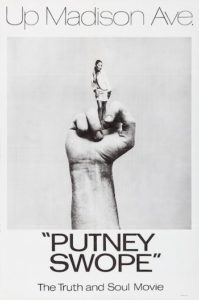
*On this date in 1969, the film Putney Swope was released. It was a satirical comedy about the advertising world, the portrayal of race in Hollywood films, and the nature of corporate corruption.
The film was written and directed by Robert Downey Sr. and starred Arnold Johnson as the title character, a Black advertising executive. Plot: Putney Swope, the only Black man on the executive board of an advertising firm, is accidentally put in charge after the sudden death of the board's chairman. Prevented by the company by-laws from voting for themselves, board members voted by secret ballot for the one person they thought could not win: Putney Swope.
Swope renames the business "Truth and Soul, Inc." He replaces all but one of the white employees with Black employees and insists they no longer accept business from companies that produce alcohol, tobacco, or toy guns. The business's success draws unwanted attention from the United States government and the President (Pepi Hermine), who considers it "a threat to national security." Swope tests his followers by saying he will return on his pledge not to take certain accounts.
He's delighted when they accuse him of copping out, then disillusioned when they relent and say they'll follow him no matter what. He walks away, leaving them to squabble over a glass bin full of money, which one sets on fire with a Molotov cocktail when he finds out he isn't getting any. In an interview on the DVD version of the film, Downey states that Arnold Johnson had great difficulty memorizing and saying his lines during the film shoot. Downey says he was unconcerned because he had developed a plan to dub in his voice to replace Johnson's.
Though the movie is in black-and-white, Truth and Soul's commercials are shown in color. In 2016, the Library of Congress selected the film for preservation in the United States National Film Registry as being "culturally, historically, or aesthetically significant."